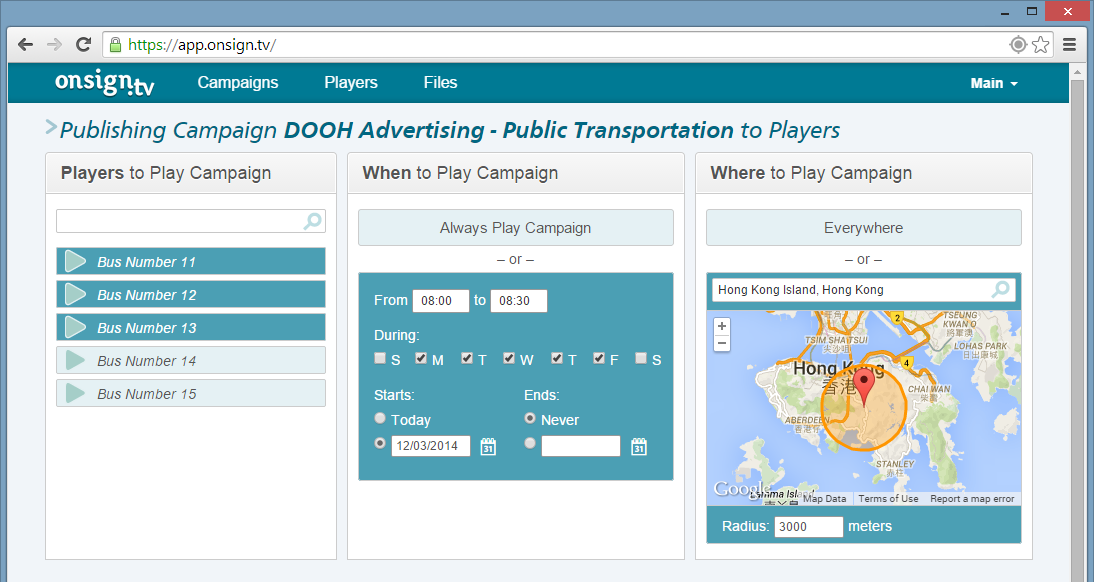Location-based advertising pinpoints the location of a consumer and provides advertisements which are specific to that location. It has been around for quite some time and has enabled marketers to reach their customers in a more direct way. This is a great way of advertising, but it has been primarily aimed at the internet world and mobile devices.
Sadly, not much focus has been cast on digital signage, which is hardly a surprise. Digital displays are nowhere near as mobile as smartphones, but that doesn’t mean they can’t benefit from a location-based feature. Although it stands to reason that geomarketing will always be more focused on the world of mobile devices, let’s take a look at what it can do for digital signage.
How does location-based advertising work?
Location-based advertising helps marketers target consumers based on where they are or where they go. It can allow you to display specific advertisements or messages to people who are at a specific location. This is made possible through the excessive use of mobile devices our society relies on every day and their built-in locating. Who gets anywhere these days without navigation?
You’ve undoubtedly seen examples of location-based advertising online where points of interest that are near your location are highlighted. As you often will surely be interested in discovering said points of interests near you, this works quite well making it one of the redefining factors of the OOH world.
Now that you grasp how location-based advertising works and what it can do, it’s important to learn how it can be of use for digital signage.
Location-based Digital Signage In Transportation
Bluntly put, location-based activity is best used for digital signage which on the go. Thus, the travel industry will benefit most from this feature. For instance, if you have displays on buses, trains, airplanes, or boats, you can set up your digital signage to play content in specific GeoRegions.
This feature can be utilized in a few different ways. First, you can display content to your audience based on the location they are currently in. If the bus with your digital signage is in a specific part of the city, you can program it to display content relevant to that location: nearby points of interest, interesting facts about the location, advertising for a local business etc. A second way is programming your digital signage to trigger specific campaigns when an invisible geographic line is crossed. This can be used for the purpose of highlighting the current location of the vehicle.
Shorten trips in buses with this feature
Buses aren’t exactly the talk of the town of travelling, if we speak honestly for a moment. Every aspect of digital signage will be an improvement here, starting from entertainment, all the way to the helping the traveller through current GPS location, upcoming stops etc.
With much time to fill, digital signage has quite a bit of work space. In this particular example of Latvia’s largest bus carrier Ecotelematics, you can see how GPS-triggered content can help inform, entertain, and lower the perceived travel time.
This is a great example of not only the software benefits but also what a good setup looks like. Just consider players who work well in poor or weak network conditions.
Create an advanced taxi experience
Taxis are one of the more up-close and personal parts of the transportation industry and even they can benefit from location-based content. This can be an additional feature along with all the others that may be set up in a taxi, such as interactivity which allows the user to research about the specific location they are going to.
A great example of how taxis can utilize location-based digital signage can be seen through InTaxi Media. They manage and setup interactive in-vehicle displays in Brazil’s largest city São Paulo, with an over 500 taxi fleet. Their ads can impact up to 200,000 people monthly. They also rely on several advanced features used in combination with location-based campaigns. You’ll definitely want to check them out!
Let’s talk about some other forms of transportation.
Trains move quickly across several different locations. Unlike buses, travelling is quick and more regions are crossed. The primary benefit in this case would be the location information to help the passenger navigate and know what the next stop is and how long it is going to take to get there. With shorter or longer delays quite common in train schedules, passengers want to be able to inform their loved ones at what specific time to pick them up at the train station at their destination.
Airplanes don’t have a very strong use for location-based content yet since passengers can’t take any action during the flight, unless they brought a parachute. Still, it can be a good source of interesting information to show the current location and fun facts about it. Thus, it has long been a standard to show an accurate estimate of when the landing is on display. The weather forecast still mostly comes from the pilot, though.
Regardless which of these you choose, here’s what an example of the setup process might look like for you if you go with a platform like OnSign TV for your location-based campaigns.
Quite straightforward, isn’t it?
As we’ve seen, the focus of geomarketing hasn’t entirely been on the world of digital signage due to their lack of mobility in most industries, the world of travel being the exception. Still, if you are a digital signage provider or if your campaigns are occasionally on the move, location-based campaigns can make it simpler to set up your digital signage.
You can get an idea how location-based digital signage can help you, even if you are not in the world of transportation. Plus, it’s even better that this feature requires no additional investment since it’s part of your chosen digital signage software and can be used at no additional charge.









